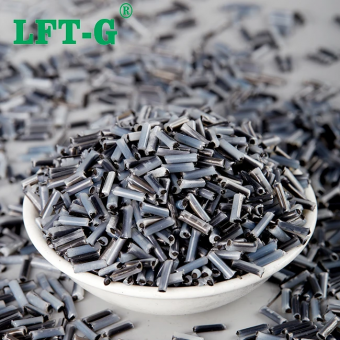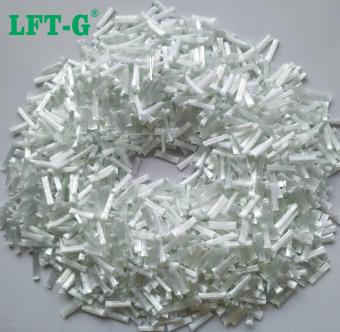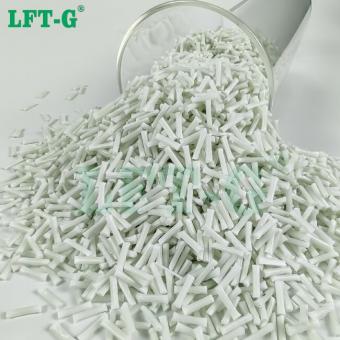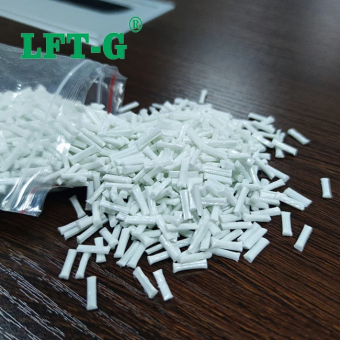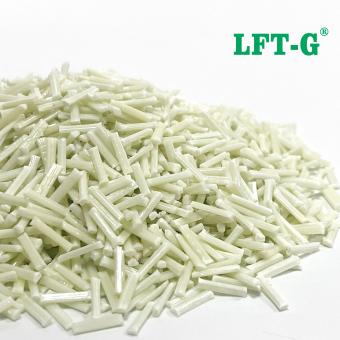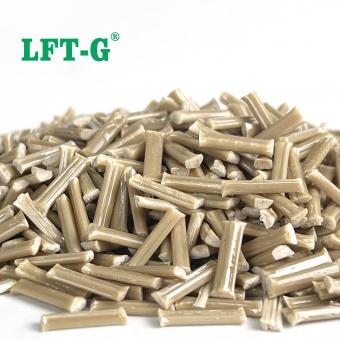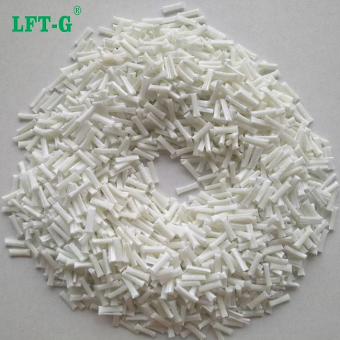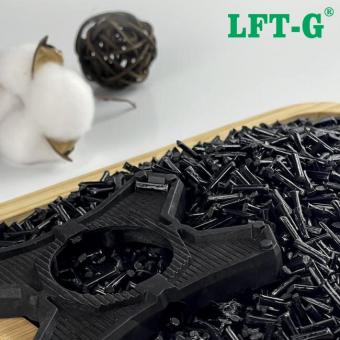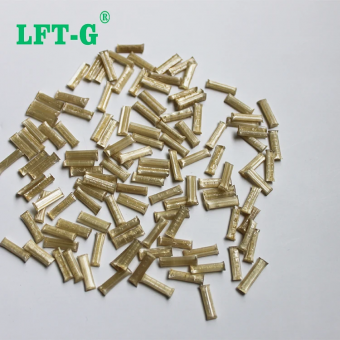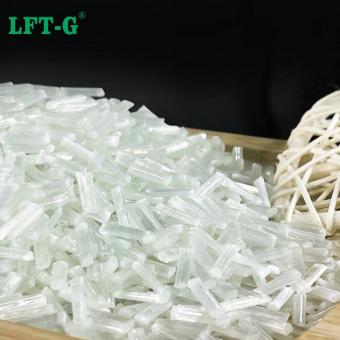-
Xiamen LFT ABS (Acrylonitrile Butadiene Styrene) Long Glass Fiber Reinforced Thermoplastic CompoundsABS is another preferred type of engineering plastic that is valued for its chemical and thermal stability, strength, toughness, and glossy finish. Its host of desirable properties make it a versatile material. It is used in everything from consumer products like toys and bicycle helmets to automotive applications such as interior trim pieces, housings for electronics, and more. After adding glass fiber to ABS, the rigidity, heat resistance and dimensional stability of the composite are significantly improved. In addition, the cost performance of ABS plus glass fiber is extremely good, which can meet the needs of manufacturers while reducing costs. About ABS-LGF compounds The main application scope of modified ABS: 1. Auto parts: instrument panels, fenders, car interiors, car lights, reversing mirrors, car audio; 2. Electronic and electrical components: IT equipment, OA equipment shells, converters, etc., power sockets, etc.; 3. Electronic appliances: switches, power switches, controllers, monitors, monitor housings, electrical housings, electrical brackets; 4. Home appliances: electrical components, electrical control boxes What Are the Advantages of ABS Injection Molding? The advantages of ABS injection molding are: 1. High Productivity - Efficiency Injection molding is a highly efficient and productive manufacturing technology and is the preferred method of manufacturing ABS parts. The process creates limited waste and can produce large volumes of parts with limited human interaction. 2. Design of Complex Parts Injection molding can produce multi-featured, complex components that can include metal inserts or overmolded soft-grip handholds. 3. Increased Strength ABS is a strong, lightweight thermoplastic that is widely used in a number of industries due to these properties. As such, injection molding in ABS is ideal for applications that require increased durability and overall mechanical strength. 4. Flexibility of Color and Material ABS is easily colored with a wide range of colors. It must be noted however that ABS has poor weathering resistance and can be degraded by UV light and prolonged outdoor exposure. Fortunately, ABS can be painted and even electroplated with metal to improve its environmental resistance. 5. Decreased Waste Injection molding is inherently low-wastage production technology due to the large production volumes that injection molding was designed for. When millions of parts are made per year, any amount of wastage adds up to a significant cost over time. The only wastage is the material in the sprue, runners, and the flashing between mold halves. 6. Low Cost of Labor Due to the highly automated nature of injection molding, very limited human intervention is required. Reduced human intervention results in reduced labor costs. This reduced labor cost ultimately results in a low cost per part. Materials Details Number ABS-NA-LGF Color Natural color or Customized Length 6-25 mm Package 25kg/bag MOQ 25kg Lead time 2-15 days Port of Loading Xiamen Port Trade terms EXW/FOB/CFR/CIF/DDU/DDP About Xiamen LFT Xiamen LFT Composite Plastic Co.,LTD was established in 2009, is a brand-name global suppliers of long fiber reinforced thermoplastic materials integrating product research & developmen (R&D), production and sale marketing. Our LFT products have passed the ISO9001&16949 system certification and have obtained lots of national trademarks and patents, covering the fields of automotive, military parts and firearms, aerospace, new energy, medical equipment, power wind energy, sports equipment, etc. LFT long fiber reinforced thermoplastic engineering materials,compared to ordinary short fiber reinforced thermoplastic materials (fiber length is less than 1-2 mm), the LFT process produces thermoplastic engineering material's fibers in lengths of 5-25 mm. The long fibers are impregnated with the resin through a special mold system to obtain long strips that are fully impregnated with the resin ,and then cut to the length as required. The most used base resin is PP, by PA6, PA66, PPA,PA12,MXD6,PBT,TPU,PPS, ABS,PEEK, etc. Conventional fibers include glass fiber, carbon fiber. Depending on the end use, the finished products can be used for injection molding,extrusion, molding, etc., or directly used for plastic instead of steel and thermoset products.
- High performance thermoplastic engineering plastics
- excellent heat resistance with filler
- injection molding products light weight
- automotive parts house hold appliances
- modified plastic manufacturer can be customized
- can be recylced GFRP GF30
Tags :
-
LFT Industrial Grade Polypropylene Long Carbon Fiber Reinforcement 20%-60%LFT Plastics are frequently used to replace metal for applications in which light weighting, improved impact strength, elastic modulus, and material strength are required.
- PP LCF CF compounds pellets granules
- Modified thermoplastic resin polymers
- easy to produce for car parts home appliance
- whole sell factory price 25kg/bag
- Low density and weight instead metal and steel
- can be customized plastic 10-12 mm length
Tags :
-
LFT Industrial Virgin Grade Polypropylene Long Carbon Fiber Reinforced Advanced PlasticLFT Plastics are frequently used to replace metal for applications in which light weighting, improved impact strength, elastic modulus, and material strength are required.view more
-
LFT Industrial Grade Polypropylene Long Carbon Fiber Reinforcement 20%-60%LFT Plastics are frequently used to replace metal for applications in which light weighting, improved impact strength, elastic modulus, and material strength are required.view more
-
Xiamen LFT high performance Polyphenylene Sulfide Long Glass Fiber Reinforced Thermoplastic PolymersPPS is a high-performance, tough engineering plastic with great dimensional and thermal stability, as well as a wide operating temperature range of up to 260 °C and good chemical resistance. Moreover, PPS, like most other thermoplastics, is an electrical insulator. Its ability to be used at high temperatures coupled with its thermal stability makes PPS great for applications such as semiconductor components in machinery, bearings, and valve seats. About PPS-LGF compounds PPS plastic (polyphenylene sulfide), English name: Polyphenylenesulfide, is a thermoplastic special engineering plastic with excellent comprehensive properties. Its outstanding features are high temperature resistance, corrosion resistance and superior mechanical properties. The product will make a metallic sound when it is dropped to the ground. . Pure PPS is rarely used alone due to its brittle performance. Most of the PPS used is its modified variety. Glass fiber reinforced PPS is one of them. PPS lengthened glass fiber (LGF) composite material has the advantages of high toughness, low warpage, fatigue resistance, and good product appearance. It can be used in water heater impellers, pump casings, joints, valves, chemical pump impellers and casings, cooling water impellers and Shells, home appliance parts, etc. Automotive industry Applications: Due to its excellent mechanical properties, thermoplastic carbon fiber is widely used in the automotive field of fuel system components, sensors, shell components. On the one hand, it is because of the high strength and stiffness of PPS-LCF, and the finished parts are not easy to damage. On the other hand, PPS-LCF also has a relatively low coefficient of thermal expansion to ensure the stability of the finished product. In addition, PPS-LCF also has very good corrosion and heat resistance, making the application life of the finished product longer. Industrial Applications: In the industrial field, it is mainly used in the parts of equipment, such as chemical processing equipment, air pumps, gaskets, valves, etc. In addition to the high strength of the PS-LCF, it is also because the parts made by the PS-LCF have very good self-lubricating properties, which is very important for mechanical parts. Therefore, compared with the traditional carbon fiber material products, the performance has been greatly improved. The wide range of applications of PPS-LCF include aerospace, automotive manufacturing, electronic equipment, chemical and medical fields. Basic Performance of PPS-LGF 1 Excellent overall performance. PPS resin is a crystalline polymer with high hardness. Its crystal content is about 65% and its density is 1.34g/cm^3. It has excellent mechanical properties. Its tensile strength and bending strength are better than those of PA, PC, PBT, etc. It has extremely high rigidity and creep resistance. The mechanical properties will better after adding glass fiber reinforcement. 2 Excellent heat resistance. Its melting point can reach 275~291℃, and its heat distortion temperature is 135℃. After glass fiber reinforcement, its heat distortion temperature can reach 260℃. In air, polyphenylene sulfide reaches the weakening temperature at about 400°C, and polyphenylene sulfide begins to decompose in air at 700°C. The long-term use temperature is 200~240℃, and the thermal stability of long-term continuous use is better than all current engineering plastics. 3 The dielectric strength is better. PPS has a symmetrical molecular structure, non-polarity, and low water absorption, so its electrical insulation is very good. Compared with other engineering plastics, its dielectric constant is small, and its arc resistance is equivalent to that of thermosetting plastics. It can be used in high temperature, high humidity, frequency conversion, etc. Under harsh conditions, PPS can still maintain excellent electrical insulation. 4 preservative. Because PPS has a high degree of crystallinity, it has excellent chemical resistance and is insoluble in any organic solvent below 200°C. In addition to strong oxidizing acids, it can withstand the erosion of various acids, alkalis, and salts. After being soaked in various chemicals for a long time, it still maintains high strength. Materials Details Number PPS-NA-LGF Color Natural color or Customized Length 6-25 mm Package 25kg/bag MOQ 25kg Lead time 2-15 days Port of Loading Xiamen Port Trade terms EXW/FOB/CFR/CIF/DDU/DDP About Xiamen LFT Xiamen LFT Composite Plastic Co.,LTD was established in 2009, is a brand-name global suppliers of long fiber reinforced thermoplastic materials integrating product research & developmen (R&D), production and sale marketing. Our LFT products have passed the ISO9001&16949 system certification and have obtained lots of national trademarks and patents, covering the fields of automotive, military parts and firearms, aerospace, new energy, medical equipment, power wind energy, sports equipment, etc. LFT long fiber reinforced th...view more
-
Xiamen LFT Thermoplastic Polyurethane (TPU) Long Glass Fiber Reinforced Thermoplastic CompoundsThermoplastic Polyurethane is soft and elastic, with excellent tensile and tear strength. For this reason, it is often used to make parts that demand a rubber-like elasticity. TPU is a little bit expensive than other resins, but there is no substitute for many applications, such as protective wire and cable sheaths. Another advantage is that TPU improves the grip for products that need to be held securely in hand. About TPU-LGF compounds What Products Are Best Manufactured via Thermoplastic Polyurethane (TPU)? Some of the TPU products manufactured are automotive instrument panels, caster wheels, sporting goods, power tools, drive belts, medical devices, footwear and etc. What is Thermoplastic Polyurethane (TPU) for Plastic Injection Molding? ETPU is a tough, highly abrasion-resistant resin that bridges the gap between rubbers and plastics. TPUs can be formulated to be rigid or elastomeric. TPU exhibits a high flex before break and is ideal for wheels and door panels. What is the Molding Temperature for Thermoplastic Polyurethane (TPU)? depending on the TPU being molded. Materials Details Number TPU-NA-LGF Color Natural color or Customized Length 6-25 mm Package 25kg/bag MOQ 25kg Lead time 2-15 days Port of Loading Xiamen Port Trade terms EXW/FOB/CFR/CIF/DDU/DDP About Xiamen LFT Xiamen LFT Composite Plastic Co.,LTD was established in 2009, is a brand-name global suppliers of long fiber reinforced thermoplastic materials integrating product research & developmen (R&D), production and sale marketing. Our LFT products have passed the ISO9001&16949 system certification and have obtained lots of national trademarks and patents, covering the fields of automotive, military parts and firearms, aerospace, new energy, medical equipment, power wind energy, sports equipment, etc. LFT long fiber reinforced thermoplastic engineering materials,compared to ordinary short fiber reinforced thermoplastic materials (fiber length is less than 1-2 mm), the LFT process produces thermoplastic engineering material's fibers in lengths of 5-25 mm. The long fibers are impregnated with the resin through a special mold system to obtain long strips that are fully impregnated with the resin ,and then cut to the length as required. The most used base resin is PP, by PA6, PA66, PPA,PA12,MXD6,PBT,TPU,PPS, ABS,PEEK, etc. Conventional fibers include glass fiber, carbon fiber. Depending on the end use, the finished products can be used for injection molding,extrusion, molding, etc., or directly used for plastic instead of steel and thermoset products.view more

 e-mail
e-mail English
English français
français Deutsch
Deutsch русский
русский italiano
italiano español
español português
português العربية
العربية 日本語
日本語 한국의
한국의 中文
中文





